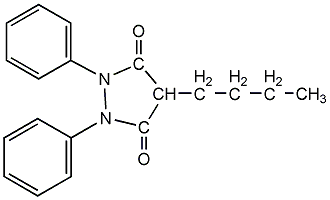
Structural formula
| Business number | 013J |
|---|---|
| Molecular formula | C19H20N2O2 |
| Molecular weight | 308.38 |
| label |
phenylbutazone, 4-Butyl-1,2-diphenyl-3,5-pyrrolidinedione, Butanone, Butazolidine, Buteqian, Benzodizoline, 4-Butyl-1,2-diphenyl-3,5-pyrazolidinedione, Phenylbutazone |
Numbering system
CAS number:50-33-9
MDL number:MFCD00005500
EINECS number:200-029-0
RTECS number:UQ8225000
BRN number:290080
PubChem number:24277729
Physical property data
1. Properties: white or off-white crystalline powder. Odorless, slightly bitter taste
2. Density (g/mL, 25/4?): Undetermined
3. Relative vapor density (g/mL, air=1) : Undetermined
4. Melting point (ºC): 104-107 °C
5. Boiling point (ºC, normal pressure): Undetermined
6. Boiling point (ºC, 5.2 kPa): Not determined
7. Refractive index: Not determined
8. Flash point (ºC): Not determined
9. Specific rotation (º): Undetermined
10. Autoignition point or ignition temperature (ºC): Undetermined
11. Vapor pressure (kPa, 25 ºC): Undetermined
12. Saturated vapor pressure (kPa, 60 ºC): Undetermined
13. Heat of combustion (KJ/mol): Undetermined
14. Critical Temperature (ºC): Undetermined
15. Critical pressure (KPa): Undetermined
16. Log value of oil-water (octanol/water) partition coefficient: Undetermined
p>
17. Explosion upper limit (%, V/V): Undetermined
18. Explosion lower limit (%, V/V): Undetermined
19. Dissolution Properties: Easily soluble in acetone, chloroform or benzene, soluble in ethanol or ether, almost insoluble in water (<0.1 g/100 mL at 23.5 ºC), soluble in sodium hydroxide solution
Toxicological data
None
Ecological data
None
Molecular structure data
1. Molar refractive index: 88.7
2. Molar volume (cm3/mol): 262.7
3. Isotonic specific volume (90.2K ): 689.4
4. Surface tension (dyne/cm): 47.3
5. Polarizability (10-24cm3): 35.16
Compute chemical data
1. Reference value for hydrophobic parameter calculation (XlogP): None
2. Number of hydrogen bond donors: 0
3. Number of hydrogen bond acceptors: 2
4. Number of rotatable chemical bonds: 5
5. Number of tautomers: 2
6. Topological molecule polar surface area 40.6
7. Number of heavy atoms: 23
8. Surface charge: 0
9. Complexity: 389
10. Number of isotope atoms: 0
11. Determine the number of atomic stereocenters: 0
12. Uncertain number of atomic stereocenters: 0
13. Determine the number of chemical bond stereocenters: 0
14. Number of uncertain chemical bond stereocenters: 0
15. Number of covalent bond units: 1
Properties and stability
None
Storage method
This product should be sealed and stored in a dry place away from light.
Synthesis method
None
Purpose
Organic synthesis. medicine.
extended-reading:https://www.newtopchem.com/archives/44159extended-reading:https://www.newtopchem.com/archives/103extended-reading:https://www.bdmaee.net/wp-content/uploads/2022/08/71.jpgextended-reading:https://www.morpholine.org/cas-33329-35-0/extended-reading:https://www.bdmaee.net/wp-content/uploads/2022/08/102-1.jpgextended-reading:https://www.cyclohexylamine.net/polyurethane-catalyst-sa102-catalyst-sa102/extended-reading:https://www.bdmaee.net/niax-a-230-composite-amine-catalyst-momentive/extended-reading:https://www.newtopchem.com/archives/44570extended-reading:https://www.bdmaee.net/wp-content/uploads/2022/08/24.jpgextended-reading:https://www.bdmaee.net/polyurethane-catalyst-a400/

